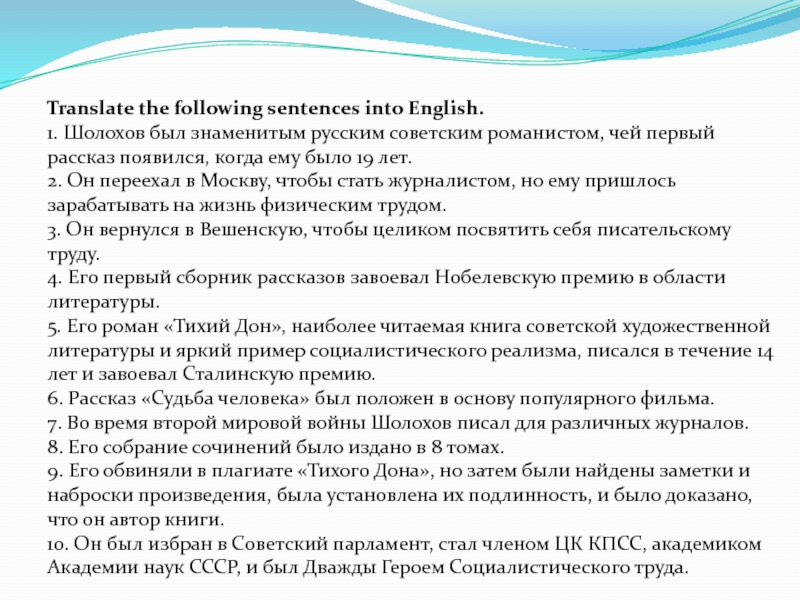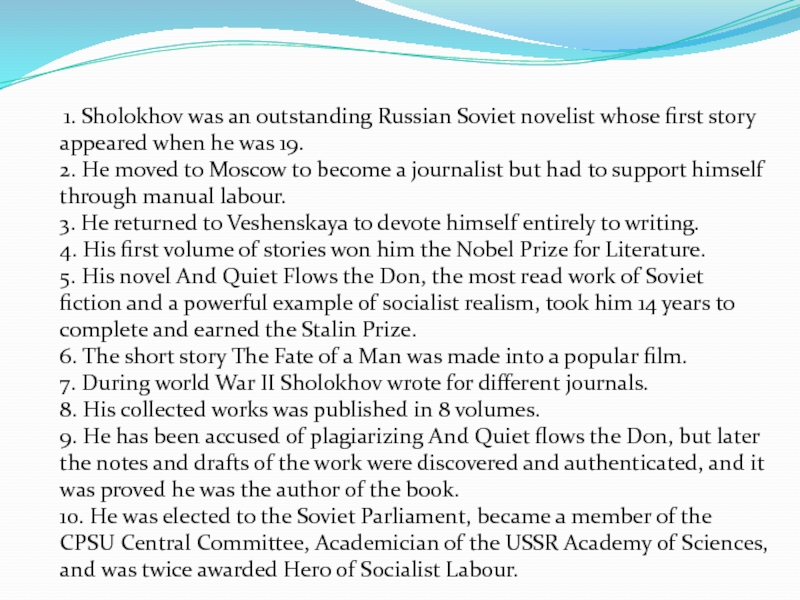Слайд 1«Mikhail Sholokhov is
an Outstanding Writer»
I was born on the DON
Regional Boarding school Rostov -on-Don
English teachers
Yablokova T.N. Nachinennaya L.S.
K Kaufman M. Kaufman “Happy Eyglish.ru”
8 Grade Unit 7 Lesson
“Great Russian Writers”
Слайд 2Sholokhov
was born in the Kamensk region of Russia, in the 'land
of the Cossacks' — in stanitsa Veshenskaya. His father was at times a farmer, cattle trader. His mother was illiterate but learned to read and write in order to correspond with her son.
Слайд 3The house in which he was born.
Слайд 4Sholokhov began writing at 17. The Birthmark, Sholokhov's first story, appeared
when he was 19. In 1922 Sholokhov moved to Moscow to become a journalist, but he had to support himself through manual labour. From 1922 to 1924 he changed many jobs, but he also participated in writers 'seminars/ In 1924 Sholokhov returned to Veshesnkaya and devoted himself entirely to writing. In the same year he got married and had two daughters and two sons.
Слайд 5His first published book being Donskie rasskazy (1926; Tales of the
Don), a collection of short stories.
Слайд 6His book Tales from the Don (1926), a volume of stories
about the Cossacks of his native region during World War I and the Russian Civil War, won him the 1965 Nobel Prize for Literature.
Слайд 7In the same year Sholokhov began writing And Quiet Flows the
Don, which earned the Stalin Prize and took him fourteen years to complete (1928—1940). It became the most read work of Soviet fiction and was a powerful example of socialist realism. Virgin Soil Upturned, which took 28 years to complete, reflects life during collectivization in the Don area.
Слайд 11 Sholokhov's best-known work, Tikhy Don, is remarkable for the
objectivity of its portrayal of the heroic and tragic struggle of the Don Cossacks against the Bolsheviks for independence. It became the most widely read novel in the Soviet Union and was heralded as a powerful example of Socialist Realism, winning the Stalin Prize in 1941.
Слайд 12
The slow evolution of Sholokhov's work is remarkable: it took 12
years to publish Tikhy Don (4 vol., 1928-40; translated in two parts as And Quiet Flows the Don and The Don Flows Home to the Sea) and 28 years to complete another major novel, Podnyataya tselina (1932-60; translated in two parts as Virgin Soil Upturned and Harvest on the Don).
Слайд 14The short story The Fate of a Man (1957) was made
into a popular Russian film and his unfinished novel They Fought for Their Country is about the Great Patriotic War. During World War II Sholokhov wrote for various journals. His collected works was published in eight volumes between 1956 and 1960.
Слайд 16In 1937 he was elected to the Soviet Parliament. In 1959
he accompanied Soviet Premier Nikita Khrushchev on a trip to Europe and the United States. He became a member of the CPSU Central Committee in 1961, Academician of the USSR Academy of Sciences in 1939, and was a member of the USSR Supreme Soviet. He was twice awarded Hero of Socialist Labour, and later became vice president of the Association of Soviet Writers.
Слайд 17And Quiet Flows the Don
became the most-read work of Soviet
fiction and was heralded as a powerful example of socialist realism, and won him the 1965 Nobel Prize in Literature.
Слайд 18It was composed of two parts: Seeds of Tomorrow (1932) and
Harvest on the Don (1960), and reflects life during collectivization in the Don area. The short story The Fate of a Man (1957) was made into a popular Russian film and his unfinished novel They Fought for Their Country is about the Great Patriotic War.
Слайд 19Sholokhov's life and work are discussed in Michael Klimenko, The World
of Young Sholokhov: Vision of Violence (1972); and Herman Ermolaev, Mikhail Sholokhov and His Art (1982). Roy A. Medvedev, Problems in the Literary Biography of Mikhail Sholokhov, trans. from Russian (1977), examines questions on Sholokhov's authorship of And Quiet Flows the Don.
Слайд 20M.A. Sholokhov died in 1984 in Veshenskaia, where he was buried.
Слайд 21Now there is a museum-reserve M.A. Sholokhov.
Слайд 23 Translate the following sentences into English.
1. Шолохов был
знаменитым русским советским романистом, чей первый рассказ появился, когда ему было 19 лет.
2. Он переехал в Москву, чтобы стать журналистом, но ему пришлось зарабатывать на жизнь физическим трудом.
3. Он вернулся в Вешенскую, чтобы целиком посвятить себя писательскому труду.
4. Его первый сборник рассказов завоевал Нобелевскую премию в области литературы.
5. Его роман «Тихий Дон», наиболее читаемая книга советской художественной литературы и яркий пример социалистического реализма, писался в течение 14 лет и завоевал Сталинскую премию.
6. Рассказ «Судьба человека» был положен в основу популярного фильма.
7. Во время второй мировой войны Шолохов писал для различных журналов.
8. Его собрание сочинений было издано в 8 томах.
9. Его обвиняли в плагиате «Тихого Дона», но затем были найдены заметки и наброски произведения, была установлена их подлинность, и было доказано, что он автор книги.
10. Он был избран в Советский парламент, стал членом ЦК КПСС, академиком Академии наук СССР, и был Дважды Героем Социалистического труда.

Слайд 24 1. Sholokhov was an outstanding Russian Soviet novelist
whose first story appeared when he was 19.
2. He moved to Moscow to become a journalist but had to support himself through manual labour.
3. He returned to Veshenskaya to devote himself entirely to writing.
4. His first volume of stories won him the Nobel Prize for Literature.
5. His novel And Quiet Flows the Don, the most read work of Soviet fiction and a powerful example of socialist realism, took him 14 years to complete and earned the Stalin Prize.
6. The short story The Fate of a Man was made into a popular film.
7. During world War II Sholokhov wrote for different journals.
8. His collected works was published in 8 volumes.
9. He has been accused of plagiarizing And Quiet flows the Don, but later the notes and drafts of the work were discovered and authenticated, and it was proved he was the author of the book.
10. He was elected to the Soviet Parliament, became a member of the CPSU Central Committee, Academician of the USSR Academy of Sciences, and was twice awarded Hero of Socialist Labour.
